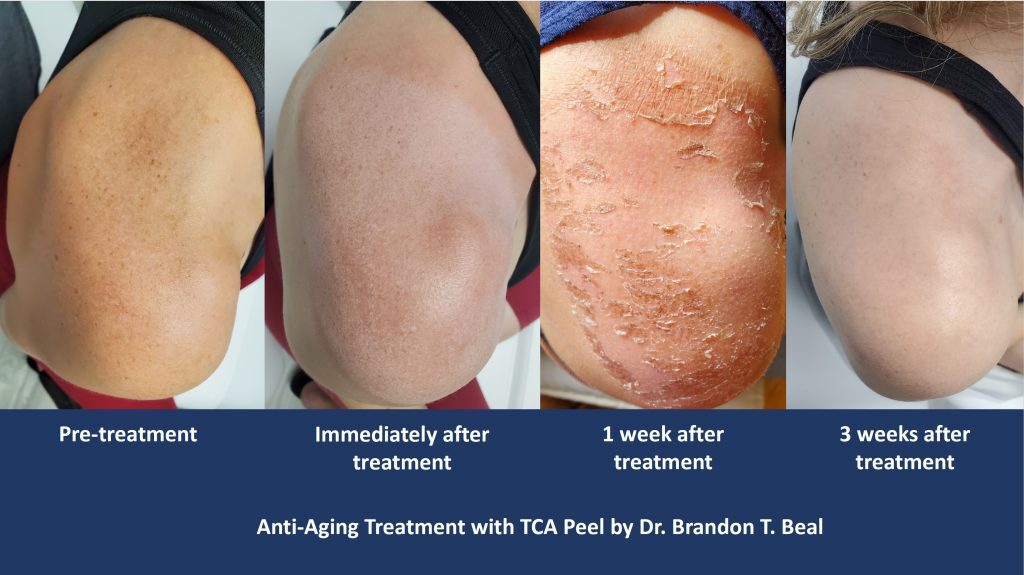Chemical Peel
Our board-certified experts in Dermatology and Cosmetic Surgery are here to help you look as good as you feel by erasing brown spots, fine lines, and wrinkles.
What is a chemical peel?
Chemical peels are a facial resurfacing technique. A chemical solution is applied to the face, improving and smoothing the skin’s texture. Chemical peels can also improve pigment irregularities like sun spots or melasma.
Chemical peels are usually performed for cosmetic reasons, such as to enhance one’s appearance; they may also be recommended to remove pre-cancerous skin growths or soften facial acne scars.
Types of chemical peels
Superficial to medium peels (the “lunch break” peel): mild chemicals (salicylic or glycolic acid) penetrate the outer skin layer, resulting in gentle exfoliation and regrowth of brighter, healthier skin with a more even tone. This chemical peel can treat skin pigment irregularities such as sunspots and melasma. A superficial peel is a great way to refresh the face, neck, chest, and hands.
Medium to deep peels: stronger chemicals (trichloroacetic acid or Jesseners) penetrate the skin’s middle and deeper layers. This peel is best for acne scars, superficial to moderate wrinkles, and facial rejuvenation. You will notice an improvement in the look and feel of your skin.
The beneficial effects of all peels should be maintained and will be prolonged with proper sun protection.

What are the benefits of chemical peels?
- Reduce fine lines under the eyes and around the mouth
- Improve the appearance of acne scars
- Treat precancerous skin growths (actinic keratoses)
- Improve skin pigmentation: lighten age spots (lentigines or liver spots) and melasma
- Improve the look and feel of your skin.
Facial Rejuvenation at St. Louis Dermatology & Cosmetic Surgery
What can you expect?
Before any procedure, you will have a consultation with our expert cosmetic dermatologists. The physician will listen to you, perform a thorough evaluation, and provide an individualized treatment plan to address your needs and concerns.
At this visit, you must inform the provider if you have a history of cold sores (herpes labialis) or any current infections.
Some patients must use a skin preparation treatment (like retinoids or hydroquinone) for up to one month before a chemical peel. Properly preparing your skin before a chemical peel improves outcomes and reduces possible side effects.
How is a chemical peel performed?
Medium to deep peels usually take 30 minutes, while more superficial peels take closer to 15 minutes. Before the treatment, your skin is cleansed to remove excess oils. Then, one of our board-certified cosmetic dermatologists will apply the chemical solution. The chemicals produce a “controlled injury” on your skin. This “injury” allows collagen and elastin to form and reveal new skin, making your skin appear more refreshed.
During the procedure, your skin may feel warm or hot for the first 5-10 minutes, and then you may feel a stinging sensation. Cool compresses will be used to keep you comfortable during the treatment.
What is involved in recovery?
After a superficial to medium chemical peel treatment, you may experience temporary flaking, scaling, redness, or skin dryness. This typically resolves in a few days to reveal brighter, healthier-looking skin.
Medium to deep peels can cause skin scaling, redness, and sometimes swelling. Healing typically takes 7-10 days.
Are chemical peels safe?
All procedures carry some risk. The deeper the peel, the greater the risk of side effects and complications. Possible side effects and complications from chemical peel include:
- Redness (erythema)
- Prolonged color changes in the skin (lightening or darkening)
- Crusting and scaling
- Swelling (edema), especially around the eyes
- Infection (people who have a history of herpes outbreaks should be pre-treated with Valtrex for one to two days because these individuals are especially prone to reactivation after a chemical peel)
- Increased skin sensitivity to sunlight. You must wear sunscreen during the healing phase. Sunscreen will also help the results of your chemical peel last longer.
- Scarring
- Allergic reaction to the chemical used
Choose St. Louis Dermatology & Cosmetic Surgery
Our Dermatologist can help you explore options to rejuvenate or refine your appearance, helping you look and feel your best. We can also help you improve your complexion and confidence and achieve younger, healthier-looking skin!
We deliver remarkable patient experiences through quality, compassion, & innovation. We are a team that cares deeply about our neighbors and is a positive resource to the community.
GET IN TOUCH

